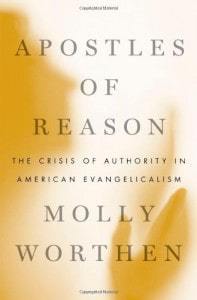 I recently stumbled onto a review of Apostles of Reason: The Crisis of Authority in American Evangelicalism
I recently stumbled onto a review of Apostles of Reason: The Crisis of Authority in American Evangelicalism by Molly Worthen. The review is by Mark Edwards and posted on Religion in American History.
I haven’t read the book, but the review and the teaser quotes Edwards gives ring true to me, and it looks like I need to add another book to my list.
From the Amazon description:
Evangelical Christianity is a paradox. Evangelicals are radically individualist, but devoted to community and family. They believe in the transformative power of a personal relationship with God, but are wary of religious enthusiasm. They are deeply skeptical of secular reason, but eager to find scientific proof that the Bible is true.
In this groundbreaking history of modern American evangelicalism, Molly Worthen argues that these contradictions are the products of a crisis of authority that lies at the heart of the faith. Evangelicals have never had a single authority to guide them through these dilemmas or settle the troublesome question of what the Bible actually means.
Edwards comments:
From my quick read, it appears that Worthen offers a new paradigm for the study of post-World War II new evangelicals–a movement that has been well covered by Joel Carpenter, George Marsden, D. G. Hart, John Turner, and many others. Yet given that her focus is the paradoxical nature of evangelical anti-intellectualism–that evangelicals “have a habit of taking certain ideas very seriously” (1)–perhaps Mark Noll is her best conversation partner. In The Scandal of the Evangelical Mind (1994), Noll argued that traits inherent to the evangelical movement had long held its promoters back from genuine intellectual and cultural pursuits. Noll’s book helped me get over my fascination with one of the Worthen’s main characters, the apologist Francis Schaeffer. The Anointed: Evangelical Truth in a Secular Age
(Belknap 2011), by Randall Stephens and Karl Giberson, similarly tackles Schaeffer and other experts ex nihilo (see Worthen’s review of Anointed here).
For Worthen, though, the problem is not that the evangelical straw man doesn’t have a brain; it has too many. The evangelicals of the American Century want to have it all: faith AND reason, status AND separateness, the Great Commission AND Great Low Prices.
I find that last paragraph to be very insightful.
Edwards provides the following choice quotes (my emphasis added) from the book, which, I have to say, resonate strongly with my experience, and some of which have also been articulated by Christian Smith in his exposé of sorts, The Bible Made Impossible: Why Biblicism Is Not a Truly Evangelical Reading of Scripture.
The problem with evangelical intellectual life is not that its participants obey authority. All rational thought requires the rule of some kind of law based on irreducible assumptions. The problem is that evangelicals attempt to obey multiple authorities at the same time. They demand that presuppositions trump evidence while counting the right kind of evidence as universal fact. They insist that modern reason must buttress faith, that scripture and spiritual feeling align with scientific reality (258). . . .
The anti-intellectual inclinations in evangelical culture stem not from wholehearted and confident obedience to scripture, or the assurance that God will eventually corral all nonbelievers, but from deep disagreements over what the Bible means, a sincere desire to uphold the standards of modern reason alongside God’s word–and the defensive reflexes that outsiders’ skepticism provokes. The cult of the Christian worldview is one symptom of the effort by many evangelical leaders to fold competing sources of authority into one, to merge inference with assumptions. The evangelicals who adopt this soft presuppositionalism hope that it might prove to be a viable political currency, one that can buy cultural capital where proof texts and personal testimony fail. These habits of mind have crippled evangelicals in their pursuit of what secular thinkers take to be the aims of intellectual life: the tasks of discovering new knowledge, creating original and provocative art, and puzzling out the path toward a more humane civilization (261).
Perhaps one way of summarizing these quotes is that evangelicalism is a phenomenon rooted in a defense of its own intellectual viability, and that intellectual defense is being challenged more and more by knowledgable insiders and outsiders. Ironically for evangelical apologists, it may be the case that the more they present their case in the marketplace of ideas, the more their ideas will be subject to these sorts of criticisms.
